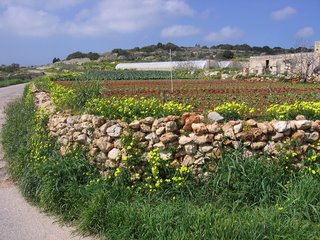Happy Birthday Lauren Priest
We had our final Maltese walk today, along the many small bays of the southeast coast closest to Libya. The major path we followed was atop a long wall of white limestone cliffs. One got the impression that some excellent diving might be done along that coast. Partly because today is a national holiday, there were also a lot of locals swimming or just sitting in the sun in the bays. Along the ridge were hundreds more birds in tiny cages, being used by men in hides to lure in their fellows for entrapment and sale.
In addition to about 350 photos taken with my digital camera, I’ve nearly finished four rolls of film. In all probability, I will be able to have a few of the digital shots online tomorrow night, with more to follow on Sunday. The film has a longer journey to make, but will ultimately be online as well. I’ve been trading URLs with some of the other relatively avid photographers in our group.
Malta, in the end, was quite a pleasant place to visit. The appeal was athletic, aesthetic, and intellectual. This is definitely an appropriate time to make the trip over, given how blisteringly hot I expect it will be here in a few months. For those of the ‘long pants, a hat, and SPF 45 sunscreen’ school of solar appreciation, now is the time to take in the views without being overly exposed to the cancer ball in the sky.
The end of poverty
As Kerrie pointed out in a comment, it is unlikely that Jeffrey Sachs’ objective of ending extreme poverty by 2025 will be achieved. If his figures are correct, that is a fairly substantial indictment of the entire rich world. While I haven’t quite finished his book, his central claim is the much of the world is caught in a ‘poverty trap’ wherein it is too poor to begin the process of development. For about eighty billion dollars a year, sustained for a decade, that vicious cycle could be broken for all those inhabitants of the planet who presently live in extreme poverty. That’s about 10% of the GDP of Canada – a nation that is neither highly populous nor highly powerful. According to Sachs, if the OECD nations actually committed the 0.7% of GDP (seven cents on every ten dollars) that they have repeatedly promised for development assistance, the gap between what the developing nations can pay and the sums required would be filled.
Even if Sachs’ most ambitious proposals are beyond what is politically possible, the idea of a poverty trap is potentially an incredibly important one. If it can be shown that countries can be lifted out of extreme poverty through what amounts to a one time grant, the prospect for eliminating extreme poverty is very real. That conjecture is certainly one that could be evaluated at a smaller scale than the laudable worldwide plan that Sachs proposes.
In any case, it is an inspiring book and one that people interested in world development should take the time to read – even if they happen to be on vacation.


Milan,
Glad you are having a good time in Malta. Getting quite excited to move in with you and Kai in exactly 9 days from today.
Alex
You’ve been posting a lot for someone on vacation.
Let the internet manage itself and enjoy the sunshine.
Which company did you do your Maltese walking tour with?
It was with HF Holidays: a British company that uses volunteers for guides.
Malta and climate change
About 400,000 people live on the tiny island of Malta. It is one of the most crowded spaces in the world.
It is also highly vulnerable to climate change. Rising sea levels in the Mediterranean over the next century caused by global warming threaten to submerge parts of the island.
But there is another aspect to sea level rise that is already having a significant effect on Malta. It is the impact on the supply of drinking water…